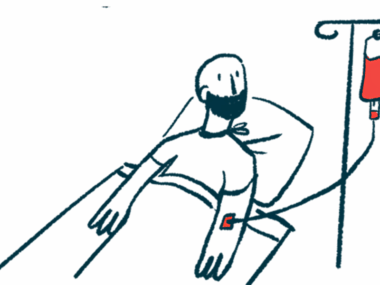Learning to practice the most important kind of love: self-love
I've learned to focus on the gift of rest, what I can do, and how I see myself
Written by |

Love. It’s a four-letter word that can mean a hundred different things, depending on how and where it’s used.
One of the things that sets my husband, Justin, and I apart from some folks is that we don’t wait for Valentine’s Day to celebrate and honor the love we have for each other. We believe it’s important to show and express love daily. As a result, we avoid the hype that surrounds the holiday, which has commercialized this emotion.
So if this column isn’t going to be about love as we think of it when we honor Valentine’s Day, than why am I even bringing it up?
Because when you have a rare disease like myasthenia gravis, there’s an even more important kind of love than the kind you find with a significant other: the love of self.
Justin’s description of how he sees me in last week’s column reminded me just how important self-talk is when it comes to the mental health and quality of life for someone like me. He reminded me that how I see myself isn’t how others see me; he sees the things I can do before the things I cannot.
I thought I’d share my Top 3 suggestions for how to learn to love yourself despite living with myasthenia gravis and other health conditions.
Suggestion 1: See yourself as more than your disability
I write about this idea a lot because I think it’s important. I’ve noticed in many of the support groups I’m part of that there’s a common belief that a myasthenia gravis diagnosis ends our chance at a quality life. The diagnosis is definitely shocking and induces grief, and that causes a period of mourning.
But an end-of-life sentence it usually is not. One of the things I do is to work daily on my mindset by focusing on the things I can do while accepting the limitations that come with those things I can’t do.
Suggestion 2: Give yourself grace and accept that resting is not laziness
That’s a big one I struggle with regularly. I’ve scheduled down days when I’m not supposed to do anything except rest. Lay my happy little tush on the couch, snuggle with my dog, Andy, and crochet or read. During these times, a boundary I’ve set for myself is to stay away from any work related to my co-working or website design businesses.
More often than not, I’m unable to go the whole day just resting. My mind gets restless, which makes me agitated. I’ll lie there and think about all the things that I could be doing — that I should be doing — rather than resting. That’s when I’ll tap into my support system so it can remind me that the reason I can “do all the things” is because I schedule the rest time my body needs. Mild frustration during rest days leads to improved well-being and productivity on good days.
Suggestion 3: Find something you enjoy doing and can do, then do it
Find a hobby that makes you smile. Even if it seems nonsensical and silly to everyone else, if it brings you joy, then do the damn thing! Finding something that fills your cup and brings you joy will in turn help you find joy in other things. It provides an activity you can focus on during the bad days when your limitations are at the forefront of your mind and helps you remember that you’re more than your diagnosis.
Self-love is more than just talking the talk about accepting yourself the way you are. It takes some mindset work. But it’s the most important kind of love out there. I’ve found that when I’ve let go of my preconceived notions and expectations of the way I – or things in general – should be, and accepted it all at face value, my ability to love myself, regardless of the diagnosis in my chart, has grown exponentially.
So whether you have a significant other, family, kids, or anyone else to say those three little words to, I hope you remember that there’s always one person who should love you. And they’re staring back at you in the mirror.
Note: Myasthenia Gravis News is strictly a news and information website about the disease. It does not provide medical advice, diagnosis, or treatment. This content is not intended to be a substitute for professional medical advice, diagnosis, or treatment. Always seek the advice of your physician or other qualified health provider with any questions you may have regarding a medical condition. Never disregard professional medical advice or delay in seeking it because of something you have read on this website. The opinions expressed in this column are not those of Myasthenia Gravis News or its parent company, Bionews, and are intended to spark discussion about issues pertaining to myasthenia gravis.







Kenneth Spencer
I was diagnosed with MG in April 2020 after having many checks for a suspected stroke all coming back negative. I was 72 and hardly had a days illness in my life. I was referred to Walton Neurological Hospital and was diagnosed after many tests. I spent 2 weeks in Walton and after that I was able to eat pureed foods and some solids which I hadnt been able to do prior, I lost 2 1/2 stone in a matter of weeks. The medication I was prescribed certainly seem to be working. In August 2020 I had a crisis and spent two weeks in Whiston hospital Liverpool when I had four days on a ventilator in a coma on oxygen. I awoke breathing very very badly and slowly with a lot of help I got stronger and eventually sat up in a chair without oxygen. My family were told when I first went in that I wasnt expected to survive the night - but I did. The end result now is that I am 76, still here, still working, still doing some walking, play walking tennis and I work an allotment. Yes Im a stubborn sod who wasnt going to let this get the better of me. I will be on medication for the rest of my life, and I will never be cured. I get tired and I have reduced strength in my arms and legs which creates some issues ( eg getting in and out of the bath ) but I get by. I lead a fairly decent life and Im not complaining. I may be one of the luckier ones but dont let this " thing" dominate your life . It certainly wont mine - I eat like a horse and especially like a steak. 3 years ago I couldnt swallow water ! I never stop talking . 3 Years ago I was a mute who talked drivel.